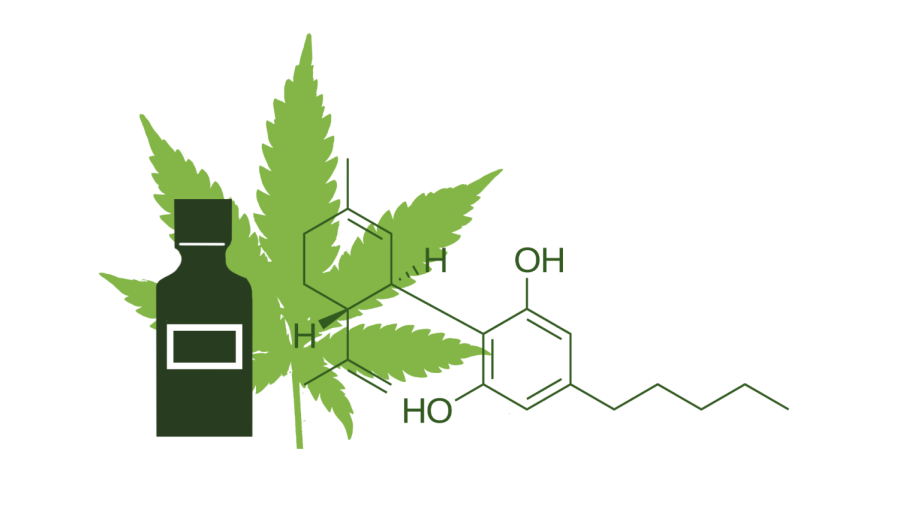Cannabidiol: What it is, what it does, and how it works
What it is
The CBD market has been predicted to hit $20 billion by 2024, according to Forbes. Yet, only 5% of Americans know what CBD is and how it works, according to a survey conducted in 2016. New CBD stores continue to pop up around Columbus, making information about CBD useful.
CBD stands for cannabidiol, the second most prevalent of the active ingredients of cannabis, otherwise known as marijuana. However, the CBD oil you find in stores or in medical marijuana is actually derived from the hemp plant, a close relative of the marijuana plant. By itself, it does not cause the “high” typically associated with marijuana. According to a report from the World Health Organization, “In humans, CBD exhibits no effects indicative of any abuse or dependence potential… To date, there is no evidence of public health related problems associated with the use of pure CBD.”
All 50 states have laws legalizing CBD with varying degrees of restriction. CBD products are legal in Georgia, with the exception of CBD in foods, beverages, animal feed, or dietary supplements. The Georgia Hemp Farming Act, passed in May 2019, formally legalized CBD products that contain 0.3% THC or less. THC, known in the scientific world as delta-9-tetrahydrocannabinol, is the compound responsible for producing the “high,” so because hemp plants, unlike marijuana plants, have very trace or no amounts of this at all, the resulting CBD products do not have intoxicating effects.
What it does
The most significant research done to date on the effects of CBD oil shows that it works for those who experience seizures. Epidiolex is a CBD oral solution that was approved by the FDA in 2018 to treat two rare forms of epilepsy—Lennox-Gaustaut syndrome and Dravet syndrome. According to scientists, the CBD helps suppress seizures by slowing down messages being sent to the brain, changing calcium levels in brain cells, and decreasing inflammation in the brain.
Other applications include managing anxiety, PTSD and cancer side effects.
Additionally, significant results from some studies have convinced many researchers, such as Integrative Medicine Specialist Melinda R. Ring, MD, executive director of Northwestern Medicine Osher Center for Integrative Medicine, believes that CBD oil “could be a powerful tool in helping individuals seeking help for addiction.” This is because its inhibitory effect may help manage triggers for cravings and anxiety in people who use addictive substances.
There are also studies that have tested the validity of CBD’s effectiveness with other ailments.
A study in the European Journal of Pain used an animal model to see if CBD could help manage arthritis pain. Their researchers noted a significant drop in inflammation and signs of pain, without additional side effects. The same report studied CBD’s effectiveness when it comes to treating chronic pain. The research again concluded that there is substantial evidence that cannabis is an effective treatment for chronic pain of all sorts. Both of these claims are also backed up by a separate study in the Journal of Experimental Medicine.
In these studies, subjects were found to not build up a tolerance to the effects of CBD, so there would be no need to increase dosages in the future.
How it works
The human body is home to what is called the endocannabinoid system. It is a fairly recently discovered part of the biological system, having only been discovered in the 1990s. Being a complex system, there is still much unknown about how it works and what it affects. What researchers do know, though, is that it impacts appetite, sleep, mood, and memory.
The endocannabinoid system has three components that already function regardless of whether someone uses CBD: receptors, enzymes, and endocannabinoids. They are a regular part of normal body function.
The receptors in this system are responsible for governing pain, appetite, memory, mood, inflammation, and coordination. Interestingly enough, researchers believe that CBD does not attach itself to the receptor as many other medicines or substances would. Rather, it influences the receptor in some way that “activates” it, allowing for the health benefits that people associate with the compound.
In Conclusion
Some CBD manufacturers have come under government scrutiny for wild, indefensible claims, such that CBD is a cure-all for cancer, which it is not. We certainly need more research, but CBD may be proven to be an option for managing anxiety, insomnia, and chronic pain after sufficient high quality human studies have been performed. Because CBD is currently mostly available as an unregulated supplement, it can be difficult to know exactly what you are getting. If you decide to try CBD, read any labels on the products thoroughly, and talk with your doctor — if for no other reason than to make sure it won’t affect other medications you are taking.








